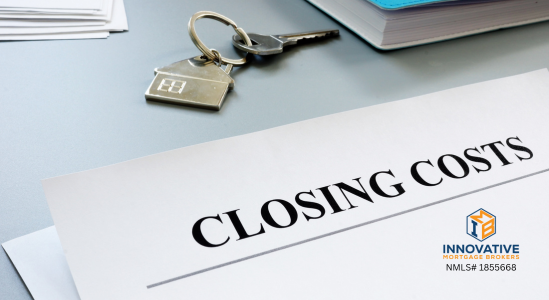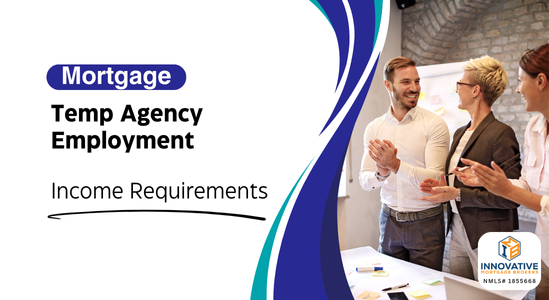Mortgage Tips for Temp Agency Workers In today’s job market, more people are choosing flexible…
Closing Costs Explained
Embarking on the journey to homeownership is undoubtedly thrilling. However, it comes with its share of complexities and financial nuances. One of the most important aspects to comprehend during this process is the closing costs associated with your new mortgage.
These costs, often overlooked amidst the excitement of purchasing a home, play a crucial role in your overall financial planning for homeownership. Understanding them can make a significant difference in your budgeting strategy and prevent any unwelcome surprises down the line.
At Innovative Mortgage Brokers, we believe in empowering our clients with knowledge. Our aim is to break down these costs into understandable components, providing you with a clear picture of what lies ahead. We’re here to guide you through every step, making sure you’re fully equipped to navigate through the financial labyrinth of the mortgage process.
What are Closing Costs?
Closing costs are a collection of fees that come into play at the finale of your real estate transaction, aptly named “closing”. These costs encompass a range of expenses, and they serve as the final hurdle before you can call the property your own.
These costs can be diverse and varied, including but not limited to attorney fees, title insurance, origination fees, appraisal fees, and even recording fees. Each of these charges plays a distinct role in the closing process. For instance, attorney fees (if required) cover the cost of any legal representation during the transaction, while title insurance protects against potential claims to the property’s ownership.
It’s important to note that some closing costs aren’t a flat fee. Instead, they are calculated as a percentage of the loan amount. On average, a home buyer can expect to pay anywhere from 2% to 5% of the loan amount in closing costs.
For example, if you’re purchasing a home with a loan amount of $300,000, your closing costs could range from $6,000 to $15,000 or more. This is a significant amount and understanding these costs can help you better plan your budget and negotiate where possible.
Remember, knowledge is power. The more you understand about closing costs, the better prepared you’ll be for a smooth and successful home buying journey.
Importance of the Loan Estimate
Applying for a mortgage can feel like navigating through a maze. But fear not, there’s a compass to guide you – the Loan Estimate. This three-page document, mandated by the Consumer Financial Protection Bureau, serves as your roadmap, providing critical information about your loan.
The Loan Estimate details your estimated interest rate, monthly payment, and most importantly, your total closing costs. It paints a comprehensive picture of what to expect, allowing you to make informed financial decisions.
Section A: Origination Charges
One of the most crucial components of the Loan Estimate is Section A, which details the Origination Charges. These are fees that your lender imposes for processing your loan application. They may encompass a variety of charges such as application fees, underwriting fees, processing fees, and points (discount points).
The sum of these charges is what you’ll pay directly to your lender, making this section an important factor in your overall cost calculation. Understanding Section A empowers you to ask the right questions and potentially negotiate better terms with your lender.
Remember, the Loan Estimate isn’t just a piece of paper; it’s a powerful tool that can help you demystify the costs associated with your mortgage and pave the way for a smoother home buying experience.
Shopping Lenders: Rate and Section A Comparison
The journey to homeownership involves more than just finding your dream home; it’s also about securing the best mortgage deal. This process requires a careful comparison of not only the interest rates offered by different lenders but also the origination charges outlined in Section A of the Loan Estimate.
Comparing interest rates is often the first step. Each lender might offer a different rate, and even a small difference can have a significant impact on your monthly payments and the overall cost of your loan. Therefore, getting several quotes is recommended.
However, the interest rate is just one piece of the puzzle. The Loan Estimate’s Section A provides a breakdown of the origination charges – the fees that lenders charge for processing your loan. These can vary significantly between lenders and include costs like application fees, underwriting fees, and processing fees and points (discount points).
When comparing lenders, carefully analyzing Section A across different Loan Estimates can help you identify who offers the most competitive lender fees. This comparison, coupled with the interest rate evaluation, can provide a comprehensive view of which lender might offer you the best overall deal.
Remember, while closing costs are an inevitable part of the home buying process, you do have control over ensuring you’re getting the best possible deal. By shopping around and meticulously comparing both rates and Section A charges, you put yourself in a position to save potentially thousands over the life of your loan.
Third Party Fees: Standard Across the Board
Beyond the lender-specific fees detailed in Section A of your Loan Estimate, you’ll find Sections B through J. These sections detail standard third-party fees – costs associated with services provided by external entities necessary to complete your real estate transaction.
Third-party fees can encompass a wide range of costs. Some common examples include appraisal fees, which cover the cost of evaluating the property’s value, credit report fees for pulling your credit history, tax service fees for ensuring taxes are paid on the property, and title insurance, which protects against potential claims to the property’s ownership.
It’s important to note that these fees are typically standard across lenders. This means regardless of the lender you opt for; these charges are likely to be similar. Unlike Origination Charges, third-party fees are not something you usually negotiate.
However, you do have some control over these fees, as you often get to choose the service providers. For example, you usually select the title company, often based on the recommendation of your real estate agent. Similarly, you choose the insurance company.
Final Thoughts
Navigating the home buying process can be daunting, but understanding your Loan Estimate and closing costs doesn’t have to be. At Innovative Mortgage Brokers, we’re committed to making this process as transparent and straightforward as possible in Pennsylvania (PA) and Florida (FL). Remember, when shopping lenders, the key is to compare both the rate and Section A of the Loan Estimate.
When it comes to securing a mortgage that aligns with your financial goals, working with us can make all the difference. At Innovative Mortgage Brokers we are dedicated to leveraging technology, industry expertise, and strategic partnerships to help you navigate the mortgage landscape in Pennsylvania (PA) and Florida (FL). We shop the loans for you.
We understand that every penny counts when buying a home. Therefore, our team works tirelessly to negotiate competitive interest rates on your behalf. We have access to a wide range of lenders and loan products, which allows us to shop around for competitive rates and low fees. Plus, our understanding of market trends and rate fluctuations enables us to provide timely advice, ensuring you lock in your rate at an optimal time.
But it’s not just about rates. At Innovative Mortgage Brokers we also strive to minimize your costs by negotiating lower lender fees. By scrutinizing the Loan Estimate’s Section A, we can assess the origination charges imposed by different lenders and advocate for reductions where possible.
Whether you’re a first-time homebuyer or a seasoned investor, partnering with us at Innovative Mortgage Brokers can streamline your mortgage journey in Pennsylvania (PA) and Florida (FL). We go beyond simply securing a loan; we aim to ensure you get the most value for your money, paving the way for a successful and financially sound homeownership experience.





